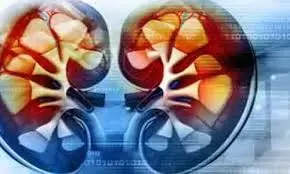- Home
- Medical news & Guidelines
- Anesthesiology
- Cardiology and CTVS
- Critical Care
- Dentistry
- Dermatology
- Diabetes and Endocrinology
- ENT
- Gastroenterology
- Medicine
- Nephrology
- Neurology
- Obstretics-Gynaecology
- Oncology
- Ophthalmology
- Orthopaedics
- Pediatrics-Neonatology
- Psychiatry
- Pulmonology
- Radiology
- Surgery
- Urology
- Laboratory Medicine
- Diet
- Nursing
- Paramedical
- Physiotherapy
- Health news
- Fact Check
- Bone Health Fact Check
- Brain Health Fact Check
- Cancer Related Fact Check
- Child Care Fact Check
- Dental and oral health fact check
- Diabetes and metabolic health fact check
- Diet and Nutrition Fact Check
- Eye and ENT Care Fact Check
- Fitness fact check
- Gut health fact check
- Heart health fact check
- Kidney health fact check
- Medical education fact check
- Men's health fact check
- Respiratory fact check
- Skin and hair care fact check
- Vaccine and Immunization fact check
- Women's health fact check
- AYUSH
- State News
- Andaman and Nicobar Islands
- Andhra Pradesh
- Arunachal Pradesh
- Assam
- Bihar
- Chandigarh
- Chattisgarh
- Dadra and Nagar Haveli
- Daman and Diu
- Delhi
- Goa
- Gujarat
- Haryana
- Himachal Pradesh
- Jammu & Kashmir
- Jharkhand
- Karnataka
- Kerala
- Ladakh
- Lakshadweep
- Madhya Pradesh
- Maharashtra
- Manipur
- Meghalaya
- Mizoram
- Nagaland
- Odisha
- Puducherry
- Punjab
- Rajasthan
- Sikkim
- Tamil Nadu
- Telangana
- Tripura
- Uttar Pradesh
- Uttrakhand
- West Bengal
- Medical Education
- Industry
CKD patients are at increased risk of heart disease, finds study

Sweden: A recent study strongly supports chronic kidney disease (CKD) being an independent risk factor for cardiovascular disease (CVD). The results, published in the journal Kidney International Reports, are essential to enable more timely and improved treatments in this population.
There is an ambiguity on whether an increased progression rate of CKD adds predictive information regarding CVD risk. Claudia S. Cabrera, Karolinska Institute, Stockholm, Sweden, and colleagues aimed to evaluate the association between CKD progression, based on estimated glomerular filtration rate (eGFR) slope estimates and the risk of CVD.
The researchers compared the updated eGFR slope calculated over multiple overlapping 2-year periods and the updated mean eGFR. CKD patients were selected from a prevalent population having type 2 diabetes (T2D). The researchers followed participants from the UK Clinical Practice Research Data Link GOLD (CPRD) from CKD diagnosis (n=30222) until heart failure (HF), myocardial infarction (MI), ischemic stroke (IS), or a composite endpoint including all three event types (MACE plus), mortality, database drop out, or end of study follow-up.
Key findings of the study include:
- Both the updated eGFR slope and updated mean eGFR were associated with MACE plus and HF.
- Updated eGFR slope decline of < -3 ml/min/1.73m2 increased the risk of MACE plus (adj HR 1.45), HF (HR 1.50), and MI (HR 1.39).
"From a clinical perspective, both rates of progression and cumulative status of CKD describe distinct aspects of the cardio-renal risk among persons with diabetes. This evidence is essential to enable a more timely and improved use of treatments in this population," concluded the authors.
The study, "Impact of Chronic Kidney Disease Progression on Cardiovascular Disease Risk in a Contemporary UK Cohort of individuals with Diabetes CKD Progression on Cardiovascular Disease Risk," is published in the journal Kidney International Reports.
Dr Kamal Kant Kohli-MBBS, DTCD- a chest specialist with more than 30 years of practice and a flair for writing clinical articles, Dr Kamal Kant Kohli joined Medical Dialogues as a Chief Editor of Medical News. Besides writing articles, as an editor, he proofreads and verifies all the medical content published on Medical Dialogues including those coming from journals, studies,medical conferences,guidelines etc. Email: drkohli@medicaldialogues.in. Contact no. 011-43720751


